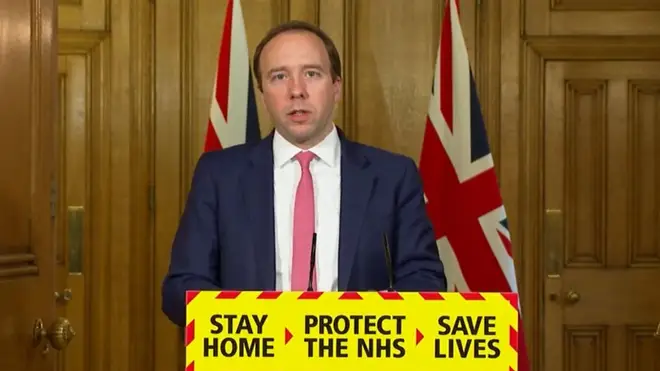
Natasha Devon 6pm - 9pm
1 March 2021, 17:50 | Updated: 1 March 2021, 20:48

Health Secretary Matt Hancock has said that receiving a single shot of either the Oxford-AstraZeneca or Pfizer-BioNTech Covid vaccine reduces the chance of needing hospital treatment by "more than 80 per cent."
Speaking at a Downing Street press conference, the Health Secretary hailed the "extremely good news", while urging people to continue to stick to the rules and "not to blow it now".
Mr Hancock said: "Today we have some new data to show on the effectiveness of the vaccine. Both its real world effect, which we can now see in the data, and some new analytical research which shows how it is saving lives.
"In terms of real world data, the number of new cases is falling, but the rate of decline has slowed. This shows how we all need to keep sticking to the rules. Let's not blow it now.
"However, the number of hospitalisations is falling faster. And even better, among the age groups who were vaccinated first, so the older age groups, the fall in hospitalisations is faster than in the younger age groups who are yet to get a jab.
"This is a sign that the vaccine is working."

Matt Hancock 'absolutely delighted' at 20 million people vaccinated
The data, from Public Health England, is based on the number of people over 80 testing positive for Covid and ending up in hospital as a result.
The study, which has yet to be peer-reviewed, included more than 7.5 million people aged 70 and over in England.
The data also shows that infections (where people display symptoms) in the over-70s fall from around three weeks after one dose of both vaccines.
Protection against even developing symptomatic Covid-19 in the first place ranged between 57 and 61% for one dose of Pfizer and between 60 and 73% for the Oxford/AstraZeneca vaccine, the study found.
On top of the protection against symptomatic disease, people who had been vaccinated with one dose of Pfizer had an additional 43% lower risk of emergency hospital admission and an additional 51% lower risk of death, according to the study.
Meanwhile, people who had been vaccinated with one dose of the Oxford vaccine had an additional 37% lower risk of emergency hospital admission, while there is currently insufficient follow-up data to assess the impact on death.
It comes as more than 20 million people in England have now received their first jab, more than a third of the adult population.
And the latest daily figures show there were 104 deaths recorded within 28 days of a positive test for coronavirus reported on 1 March 2021.
Read more: PM says 'we moved as fast as we could' on quarantine - after Brazilian variant found in UK
Read more: School staff at 'no greater risk' of Covid infection than other working-age adults

Matt Hancock discusses the Brazil Covid variant
Mr Hancock continued: "But where you can really see it is in the data on deaths. We can see that the number of deaths each day is thankfully falling much, much faster than in the first peak. As you can see it is falling faster in the over-80s who got the jab first than in the under-80s.
"And taken together, this difference in the date between older and younger groups shows a vaccine gap - this is a gap between the rate of decline between the older and younger groups where the older groups were vaccinated first.
"And the rate of decline for the number of people dying each day is going faster amongst the over-80s. This shows in the real world data, across the UK, that the vaccine is helping to protect the NHS and save lives.
"These real world effects are backed up by exciting new data which shows that a single shot of either the AstraZeneca or the Pfizer vaccine works against severe infection amongst the over-70s with a more than 80 per cent reduction in hospitalisations.
"This is extremely good news. In fact, the detailed data shows that the protection you get from catching Covid 35 days after you first vaccine is even slightly better for the Oxford jab than for Pfizer, albeit both results are clearly really strong."

Matt Hancock: No need to delay reopening schools due to Brazil variant
England's deputy chief medical officer Professor Jonathan Van-Tam also welcomed the new data on vaccines.
He said data on individuals aged 70 and over shows that for both Pfizer and the Oxford/AstraZeneca jabs there is vaccine effectiveness against illness of approximately 60% after one dose.
Prof Van-Tam said the data shows the vaccines are reducing the likelihood of hospital admission by 80% after one dose.
Data for the Pfizer vaccine shows the likelihood of mortality is reduced by 85% in over-70s, he added.
He told the Downing Street briefing that the data "gives us those first glimpses of how, if we are patient, and we give this vaccine programme time to have its full effect, it is going to hopefully take us into a very different world in the next few months".
Encouraging people to continue to come forward for their first and second doses, he added: "We have to be patient. We have to push on with the vaccine programme."
Dr Mary Ramsay, PHE head of immunisation, said of the study: "This adds to growing evidence showing that the vaccines are working to reduce infections and save lives.
"While there remains much more data to follow, this is encouraging and we are increasingly confident that vaccines are making a real difference.
"It is important to remember that protection is not complete and we don't yet know how much these vaccines will reduce the risk of you passing Covid-19 on to others.
"Even if you have been vaccinated, it is really important that you continue to act like you have the virus, practise good hand hygiene and stay at home."